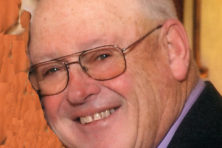Conversing with Corky
- Share
- Tweet
- Pin
- Share

Blues harmonica-player and pianist Corky Siegel started performing in 1965, and hasn’t slowed his roll since. After learning his craft from first-generation blues artists like Muddy Waters, Howlin’ Wolf and Willie Dixon, Siegel went on to record with labels like RCA Records, Vanguard Records and Deutsche Grammophon and was later inducted into the Chicago Blues Hall of Fame.
Connections with musician Dorothy Scott and Terry Lundahl of Egg Harbor’s Peg Egan Performing Arts Center have drawn Siegel to play on the peninsula before, and he’ll be back again on Jan. 12.
We caught up with Seigel before his show, which is part of the Village of Egg Harbor’s winter concert series, “The Art of Music.” The conversation has been edited for clarity and brevity.
Sam Watson (SW): I talk to a lot of guitarists and singers during these Q&As, but not a lot of harmonica-players. What drew you towards the harmonica?
Corky Siegel (CS): My major in college was classical saxophone, and it was a lot to carry around. The harmonica was much easier to just put in my pocket. That’s really the reason.
SW: And you play the piano, too?
CS: Yes. That was not easy to put in my pocket. But I have one [piano] I go to, and one I take with.
SW: What first got you interested in music?
CS: I think everyone is already interested in music; it’s a very natural thing. But what happens is people try and make us not interested in it by making us think it’s this burden in some way. There’s all these rules about what’s good and what’s not, and they end up being our guide when they’re more of a distraction.
I didn’t always have the skill level to do music the way I was supposed to, but I loved music so much that I started just doing what came easy to me.
SW: Going off of all of the accolades you’ve received over the years, it seems like that has worked for you. Was there a moment you realized you had “made it” as a musician?
CS: I think that moment might be coming soon. When I got together with Jim Schwall, a guitar player, and we eventually became known as the Siegel-Schwall Band, neither one of us had any ambition about the music business other than just wanting to play.
We reminded each other of that, but Jim was sort of the leader, like, “Hey, Corky, aren’t we supposed to be having fun? Are you sure you want to go to California because RCA Records wants to play at this party and serve the egos of the people in the music industry?” And I said no, so we didn’t do it.
We made a lot of really horrible mistakes that all turned out to be amazing blessings. Like Jerry Weintraub, who managed Elvis Presley, John Denver and Frank Sinatra, wanted to manage Siegel-Schwall. He kept calling me, and he said, “We’ll make you a million dollars’ profit in the first year.” But he wanted to put us on the road for 300 days a year. So I said goodbye.
So the moment I realized I made it in music was the moment I realized I’m just doing this to have fun.
SW: How do you stay interested in making music after doing it for so many years?
CS: Even if I played the same song over and over and over, every single day, it wouldn’t be the same song every time; there would be different things happening. Music makes itself fresh, and the spontaneity is always there. It’s always trying to help out, and we’re trying very hard not to let it in, because we want to make things happen just the way we want to make them happen – but we have to welcome spontaneity.
I define a master artist as someone who can – who does – alter every single element of music through his expression – pitch, rhythm, time, dynamics, tonal qualities. My theory is that older musicians who have been playing all their life do this automatically, because they’ve found ways of making the music more exciting, simply by varying all the elements you can use.
We all do that in conversation; speaking quietly, then making a point loudly. And music is even more complex, so the possibilities are infinite.
SW: Why were you drawn to the blues?
CS: Some genres have had a lot of time to come up with a lot of rules, but blues is fairly new and expression was named as its mission. It’s understood that blues is supposed to be expressive and the musician can throw his personality into the music, whereas with jazz and classical music, many times, you’re told, “You have to let the music do the talking; don’t get in the way of it.”
Blues was a simple form, something that was easy for me to grasp right away and express myself through. And politically, I felt drawn to it. I was told when I was a boy that we treat everyone equally in America, and I looked out my window and saw that wasn’t true. So I ended up spending a lot of time on the other side of the tracks where I felt comfortable, and that’s where the blues clubs were.
Corky Siegel will play at the Donald and Carol Kress Pavilion, 7845 Church St. in Egg Harbor, on Jan. 12 at 7 pm. Tickets are $15/person. Reservations are recommended and can be made at kresspavilion.org/winterconcertseries.


